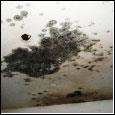General Mold Information
What is mold?
Mold is a natural part of the outdoor world. The role of mold in nature is to decompose or break down organic materials. Indoors, mold reproduces by tiny spores that can be present on both surfaces and in the air. Mold needs moisture to grow but remains allergenic and toxigenic even when dead.
 Mold can make you sick. Allergenic molds cause allergy-like symptoms like coughing, sneezing, runny nose, and itching eyes. The presence of Stachybotrys, Memnoniella and Aspergillus (Pencillium) molds are much more serious. Potentially toxic mold, such as Stachybotrys or black mold, is found mainly on damp cellulose-containing materials like wallboard, sheetrock, or cardboard. These molds can produce chemicals called mycotoxins that cause illness in people and animals. Toxic mold has been linked to bleeding lungs in infants and even death, particularly in the young and elderly. Research has linked exposure to toxin producing mold to asthma symptoms. A person exposed to mycotoxins can have a variety of symptoms including sore throat, cold or flu symptoms, fatigue, headache, and other ill-health effects. Toxin producing mold has also been suspected to be a cause of Sick Building Syndrome.
Mold can make you sick. Allergenic molds cause allergy-like symptoms like coughing, sneezing, runny nose, and itching eyes. The presence of Stachybotrys, Memnoniella and Aspergillus (Pencillium) molds are much more serious. Potentially toxic mold, such as Stachybotrys or black mold, is found mainly on damp cellulose-containing materials like wallboard, sheetrock, or cardboard. These molds can produce chemicals called mycotoxins that cause illness in people and animals. Toxic mold has been linked to bleeding lungs in infants and even death, particularly in the young and elderly. Research has linked exposure to toxin producing mold to asthma symptoms. A person exposed to mycotoxins can have a variety of symptoms including sore throat, cold or flu symptoms, fatigue, headache, and other ill-health effects. Toxin producing mold has also been suspected to be a cause of Sick Building Syndrome.
Black Mold Basics
 Stachybotrys was given the common name "BLACK mold" back in the late 1990s and early 2000s during the heavy media coverage of infant deaths. The media reported that infants died from lung hemorrhages from exposure to Toxic Black Mold, Stachybotrys.
Stachybotrys was given the common name "BLACK mold" back in the late 1990s and early 2000s during the heavy media coverage of infant deaths. The media reported that infants died from lung hemorrhages from exposure to Toxic Black Mold, Stachybotrys.
Stachybotrys is a greenish-blackish mold that grows well on cellulose containing materials. Cellulose is wood, so things like paper, lumber, paper backing on sheetrock, fiberboard and some textiles etc. are frequent sources of contamination indoors.
Although Stachybotrys is black in color, so are many other types of mold. Do not assume you have Stachybotrys just because the mold is black.
What toxin is produced by mold?
The toxin produced by mold is a by-product generated as the mold metabolizes nutrients. Mycotoxin is the toxin produced by mold, and there are many types of mycotoxins. Here are a few types of mycotoxins or mold/fungal toxins:
-
Aflatoxin
-
Trichothecenes
-
Fumonisin
-
Ochratoxins
Mycotoxins are volatile organic chemical compounds. Trichothecene is the name of the toxin that Stachybotrys can produce under certain conditions. Mycotoxins in general are very long chemical chains and tend to remain chemically stable for many years.
Not all molds produce toxins; even if the type of mold you have is reported to be a potential toxin producer, it doesn't mean all the mold you have is actually producing toxin or all the mold spores of that mold are toxin producers.
Where can I learn more about the many types of mold?
These reference documents should help in understanding mold:
-
Homeowner Frequently Asked Questions Get answers to the most frequently asked questions about mold in your home, how to read your report, and what to do if you have dangerous mold.
MoldLab maintains an excellent website with a great deal of information. You
can find more information here.
What Laboratory does LabTech use to provide test evaluations?
LabTech is pleased to offer the excellent services of MoldLab, Ltd. a highly regarded laboratory which has been performing mold test analysis for many years. LabTech chose MoldLab to provide lab results to LabTech customers after reviewing the laboratory’s practices and standards. MoldLab is AIHA EMPAT proficiency tested, licensed Mold Laboratory by Texas Department of Health, Certified by HUB and WBE, and complies with all EPA and State requirements.
Need More Information?
Refer to our FAQs if you have additional questions about mold, want more information about how to proceed, or have questions after you have received your results. If you don’t find your questions answered there or in the following links, please contact the lab at 972-236-7149. Friendly and knowledgeable support staff are ready to help.